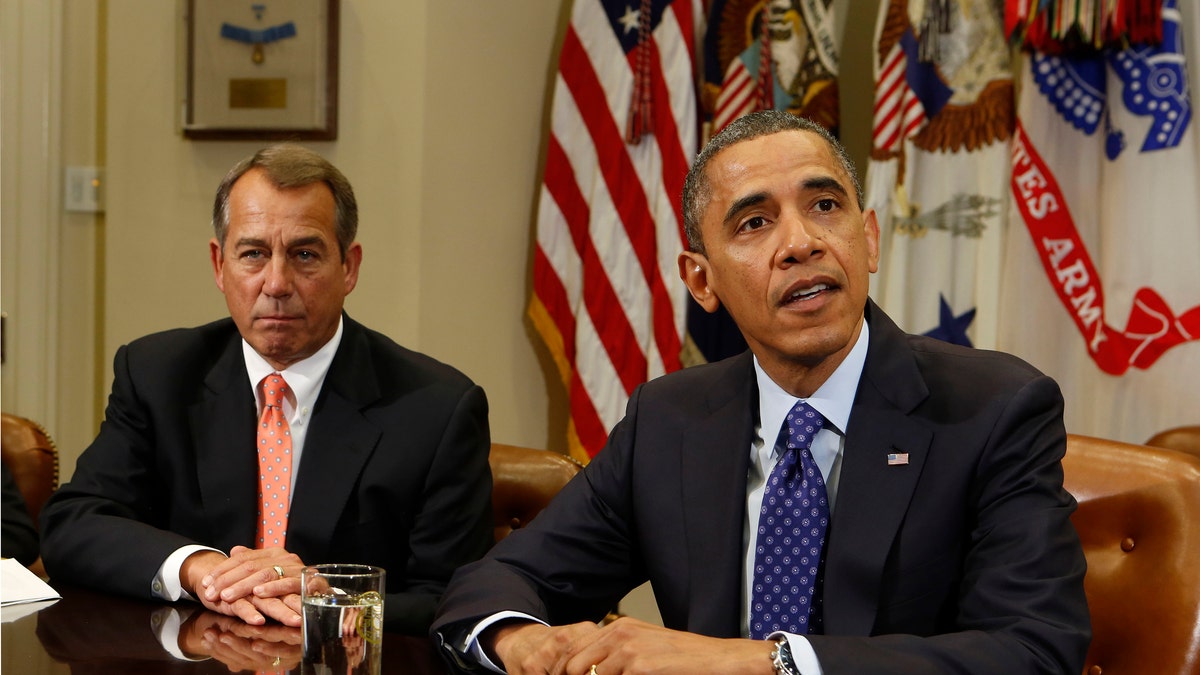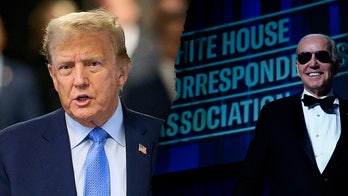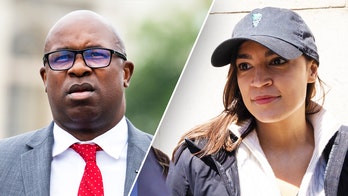
FILE: Nov. 16, 2012: President Obama and House Speaker John Boehner meet in the White House's Roosevelt Room, Washington, D.C. (REUTERS)
After an election year in which legislative business practically ground to a halt, Congress is poised to make up for lost time in 2013.
The new Congress will begin its next session with an agenda expected to focus largely on issues that re-emerged over the past several weeks and months, with gun legislation and immigration reform near the top.
Though fiscal issues will remain a priority, how much work lawmakers put into them depends on whether, or to what extent, President Obama and congressional Republicans resolve the fiscal crisis in the closing days of this session.
A basic deal to prevent some of the $600 billion mix of tax increases and automatic spending cuts from kicking in Jan. 1 would still leave the 113th Congress to address debt ceiling and tax code issues.
But in the near term, immigration legislation appears to be high on the docket in the next Congress and second Obama administration term.
Washington has tried for years to change the country's immigration policy -- to strengthen border security and stem the flow of illegal immigrants into the U.S.; to reform the visa system for the benefit of those legal immigrants following the rules; and figure out how to address the millions of illegal immigrants already here.
Legislative efforts by Democrats and Republicans on comprehensive immigration reform had reached a standstill -- until the issue re-emerged during this election cycle when Obama suspended deportation for many young immigrants brought to the U.S. illegally by their parents.
Republicans have since signaled their intentions to be the first to introduce and pass more comprehensive legislation to deal with the roughly 11 million illegal immigrants in the United States, especially after Obama won re-election with roughly 71 percent of the Hispanic vote.
However, Obama appeared to re-stake his turf Sunday, saying he would introduce legislation next year to fix “our broken immigration system.”
Danielle Doane, director of government studies at the conservative Heritage Foundation think tank, said the question about what will be on the new Congress' agenda is really two basic questions: “What will be their priorities and what will they be forced to deal with?"
Gun control could answer both of those questions. Obama and leaders of the Democrat-controlled Senate have made clear their intentions to promptly introduce legislation restricting firearms, in the aftermath of the Dec. 14 shooting at a Connecticut elementary school in which six adults and 20 first-graders were killed.
California Sen. Dianne Feinstein and other Democrats want to re-institute an assault-weapons ban – a plan Obama on Sunday again publicly supported. And related legislation could include proposed bans on high-capacity ammunition clips and tighter background checks for gun buyers.
Lawmakers have suggested over the past weeks that debates on gun control could start as early as this month and delay those on immigration reform until spring – given the political climate and the Senate Judiciary Committee having oversight on both issues.
However, Democrats can expect strong opposition from Republicans and the National Rifle Association, the country’s most influential gun lobby. And large-scale Second Amendment changes are not expected, even if Democrats pass legislation.
The president on Sunday said energy issues are also on his high-priority list, specifically how the country can produce more energy in environmentally conscious ways, and mentioned 15 times in an interview with NBC News the need for further deficit reduction.
Congressional leaders appeared reluctant over the lame duck session to say what will be their top priorities.
A spokesman for House Majority Leader Eric Cantor, whose office plays a major role in setting the agenda, said lawmakers were focused on solving the fiscal crisis.
Senate leadership did not return calls, nor did the Center for American Progress, a liberal think tank influential in setting Democratic legislative policy.
However, Doane thinks the Republican-controlled House will again focus on budget-related issues.
"We'll likely see debt and deficit issues weaving throughout next year," she said.
The recent fiscal negotiations failed to include cuts to such major entitlement programs as Medicare and Social Security – an issue fiscal conservative are expected to revisit.
And even if Congress extends the so-called "Bush-era" tax rates, that still leaves members trying to overhaul the U.S. tax code.
"There's a lot of stuff wrapped into the extensions alone," Doane said.
The fiscal talks also failed to address the recurring debt ceiling issue.
A deal in Congress in the summer of 2011 raised the ceiling and narrowly averted the U.S. from defaulting on its debt. But just last week, Treasury Secretary Timothy Geithner said the country is again approaching its debt limit and would likely default without congressional action in the next couple of months.
South Carolina Sen. Lindsey Graham told “Fox News Sunday” he would not vote to raise the ceiling if entitlement reform was left out of the deal.
“Why would I raise the debt ceiling again unless we address what put us in debt to begin with?” he asked. “I’m not going to raise the debt ceiling unless we get serious about keeping the country from becoming Greece, saving Social Security and Medicare.”




